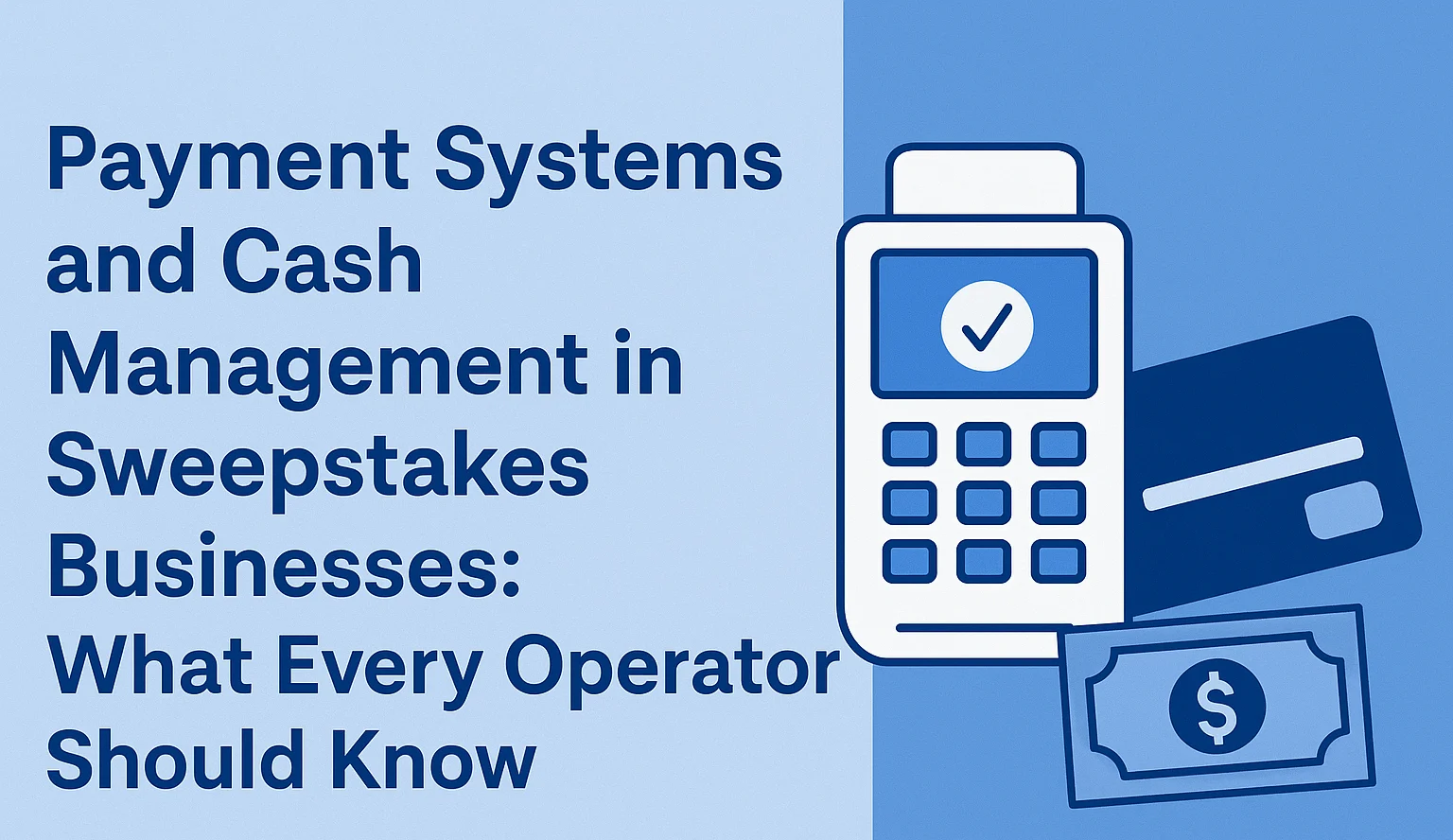
If you talk to anyone who’s been running a sweepstakes game room for a few years, they’ll probably tell you the same thing: the games bring people in, but the payment system is what keeps the doors open. It’s not the most exciting part of the business — in fact, most new operators underestimate how critical it is — but how you handle money touches every piece of your operation.
Payments are where trust is built. They’re how players decide whether they want to come back tomorrow. They’re also where regulators look first if they ever audit your business. And in 2025, with cashless trends accelerating and compliance requirements getting stricter, you simply can’t afford to treat payment systems as an afterthought.
Let’s break down what that means in practice.
Why Payments Deserve Your Attention
There’s a straightforward reason payment systems matter so much in sweepstakes: people are handing you real money in exchange for a digital experience. If that exchange ever feels slow, confusing, or unreliable, you lose credibility — and customers don’t return.
A few specific points most operators learn quickly:
- Smooth payments = more revenue. The easier it is to load credits or redeem winnings, the more often players will do it.
- Trust is fragile. One bad payout experience can undo dozens of good ones.
- Cash flow affects everything. Delays, errors, or mismatches can quietly drain profits and eat into staff time.
It’s not just about speed. It’s about making every transaction feel safe, predictable, and seamless — because that’s what keeps people playing.
Common Payment Options in Sweepstakes Rooms
Most sweepstakes venues today rely on a mix of payment tools rather than one single solution. The right choice often depends on your customer base, your location, and how automated you want your operations to be.
1. Cash Terminals
Still the backbone for many game rooms. Players like the familiarity, and cash is straightforward. Terminals accept bills and can also pay out winnings.
Where they shine:
- Quick setup and simple to use
- No third-party processing fees
- Works well in cash-heavy areas
Downsides:
- You’re responsible for physical cash security
- Higher risk of theft or errors
- Manual reconciliation can be time-consuming
2. POS Terminals and Card Readers
As more players expect card options, these systems are becoming standard. They speed up payments and reduce how much cash you need on hand.
Pros:
- Faster reloads and transactions
- Easier tracking for accounting and reporting
- Less physical cash to manage
Cons:
- Transaction fees eat into margins
- Chargebacks are a real risk if not handled carefully
3. Mobile and Contactless Payments
Younger players especially expect the option to use Apple Pay, Google Pay, or similar tools. It’s convenient for them and efficient for you.
Pros:
- Very quick transactions
- No need to handle cards or cash
- Can tie into loyalty programs or player accounts
Cons:
- Requires reliable internet and security measures
- Still not preferred by all customer segments
Many successful operators use a hybrid setup: cash terminals for convenience, POS for flexibility, and mobile for future-proofing.
Cash Management: Where Mistakes Are Most Expensive
Even if most of your revenue is digital, cash will always play some role — and mishandling it is one of the fastest ways to lose money or attract regulatory attention.
A few habits separate well-run operations from the rest:
Secure Handling
- Lockable storage, dual control for safe access, and surveillance are non-negotiable.
- Limit who can handle cash and make sure responsibilities rotate.
Daily Reconciliation
- Every shift should end with a reconciliation between cash on hand and system logs.
- Treat discrepancies seriously — they rarely fix themselves.
Fraud Prevention
- Look for patterns like frequent small payouts or unusual transaction timing.
- Real-time software alerts can catch issues before they grow.
Staff Training
- Many cash losses happen not from theft but from simple mistakes.
- Regular training keeps procedures fresh and consistent.
It’s not glamorous work, but it’s foundational. Operators who neglect it often find problems too late — when margins are already suffering.
Compliance Isn’t Optional
If you run sweepstakes in the U.S., payment systems also carry legal weight. Regulators expect clear, auditable records that prove your promotions follow the law. Good payment infrastructure helps you do that automatically.
Here’s how:
- Record-keeping: Detailed logs of every transaction make audits straightforward.
- Reporting: Automated systems can generate the kind of summaries state authorities often request.
- AML protection: Proper monitoring reduces the chance your business could be used for money laundering.
Think of payment compliance as part of your brand. When customers and regulators see that you take financial integrity seriously, they’re more likely to trust you — and trust is a competitive advantage in this space.
Why Integration Matters More Than Ever
One of the most common mistakes new operators make is running payment systems separately from their sweepstakes software. On paper it might seem fine — but in reality, it’s a source of errors, delays, and missed data.
When payments are integrated with your game platform:
- Transactions process faster, so players spend less time waiting.
- Balances update instantly, improving transparency.
- Reports are unified, which simplifies accounting and compliance.
- Fraud detection becomes easier because all activity is tracked in one place.
This is an area where dedicated solutions like Riverslot’s platform stand out. It’s designed to connect payment systems — from cash and card to mobile and kiosk — directly with game management, so operators don’t have to stitch together multiple tools.
The Shift Toward Cashless in 2025
Across the industry, the direction is clear: cashless or hybrid payment models are on the rise. A few reasons why:
- Customer habits: People carry less cash than they did even three years ago.
- Regulation: Digital records make compliance easier.
- Efficiency: Fewer staff hours go to counting, storing, and moving physical money.
Self-service kiosks, in particular, are changing the game. They combine payment, account access, and game launching in one step — often without staff involvement. That’s attractive to both players and operators.
Even if you’re not ready to go fully cashless, offering at least one digital payment option is becoming a baseline expectation. The longer you wait, the harder it gets to compete.
How Riverslot Approaches Payment Systems
Riverslot is a good example of how a modern sweepstakes platform can simplify payment complexity. The company’s software supports:
- Standard cash terminals for traditional operations
- Integrated POS solutions for debit and credit cards
- Mobile payment compatibility for contactless transactions
- Automated kiosk interfaces that tie everything together
The goal is straightforward: give operators flexibility without adding technical headaches. And because all payments connect directly with reporting, reconciliation, and player account management, compliance and operations become much easier to manage.
Final Thoughts
In sweepstakes gaming, payments are not a side topic — they’re the infrastructure your business is built on. Done well, they create trust, speed up revenue, reduce risk, and make compliance almost automatic. Done poorly, they quietly erode profits and credibility over time.
The good news is you don’t have to build all of this from scratch. Platforms like Riverslot are designed specifically for sweepstakes environments, with payment tools that integrate smoothly and scale with your business.
If you’re planning to launch a new game room — or modernize the one you already have — start with your payment strategy. It’s the foundation everything else depends on.
